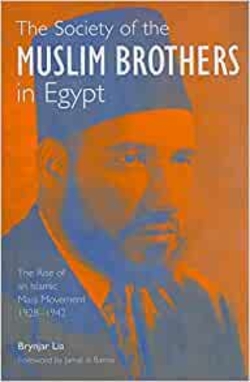 The best known study of Egypt's foremost fundamentalist Islamic movement, Richard Mitchell's Society of the Muslim Brothers (1969), portrayed the organization as a reactionary response to Westernization mounted by those left in its wake. And, indeed, this was the general interpretation of fundamentalist Islam by most writers on the subject before 1990 or so. Now, however, a thoroughly different (and much improved) interpretation rules, one that sees the Muslim Brothers and like movements as a facet of modernization. Their personnel are urbanites dealing with the cutting edge of modern problems; their ideas, methods, and goals all incorporate modern ways; and they show far more willingness to learn from the West than was hitherto realized.
The best known study of Egypt's foremost fundamentalist Islamic movement, Richard Mitchell's Society of the Muslim Brothers (1969), portrayed the organization as a reactionary response to Westernization mounted by those left in its wake. And, indeed, this was the general interpretation of fundamentalist Islam by most writers on the subject before 1990 or so. Now, however, a thoroughly different (and much improved) interpretation rules, one that sees the Muslim Brothers and like movements as a facet of modernization. Their personnel are urbanites dealing with the cutting edge of modern problems; their ideas, methods, and goals all incorporate modern ways; and they show far more willingness to learn from the West than was hitherto realized.
In a very impressive research effort into the early years of the Muslim Brothers, Lia (a Norwegian scholar) relies on new sources and deep knowledge of his subject to show convincingly just how well that movement does fit the new interpretation. He establishes that it organized in ways novel for Egypt and mobilized elements of the population hitherto neglected. But its greatest importance lay in developing an answer to the rampant European ideologies of the 1930s: in this, the Muslim Brothers began "a lasting process of renewal ... in which religion was related to the modern age and all aspects of modern life." With justification, Lia concludes that the Muslim Brothers' "reinterpretation of Islam will remain the most far-reaching Islamic renewal this century."
May 19, 2021 update: Lia has extended his thanks for the favorable review above.
MidEast studies profs boast of their tawdry motives. Brynjar Lia (@brynjarlia) of @UniOslo, publicly admitted that conspiracy theories are understudied because writing about them means having to cite me & "who'd want to have Daniel Pipes in his footnotes?"https://t.co/6dHt9woZ4Z pic.twitter.com/RoD5xLPfmO
— Daniel Pipes دانيال بايبس (@DanielPipes) May 19, 2021